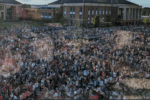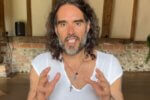David, the King Israel, a man after God’s own heart, had sinned greatly. He had an affair with his friend’s wife and got her pregnant. As if this was not bad enough, David sent his friend into a deadly battle so that the man would die and the pregnancy would be hidden. God, through the prophet Nathan, scorned David for these actions. Nathan explained the long-lasting repercussions of David’s sin. In addition to the long-term consequences, Nathan tells David that the baby will die. David fasted and prayed. At the end of the seventh day, the child died.
David’s Response to Disappointment
“So David arose from the ground, washed, anointed himself, and changed his garments. Then he entered the house of the Lord and worshipped. He then went in to his own house. When he asked, they set down food for him and ate. His servants said to him, ‘What is this thing you have done? You fasted and wept for the sake of the living child, but when the child died, you arose and ate food.’ He explained, ‘As long as the child was alive, I fasted and wept because I thought, “Who knows? The Lord may be gracious to me, so that the child may live.” But now he is dead. Why should I fast? Am I able to bring him back again? I will go to him, but he will not return to me.’ Then David comforted Bathsheba, his wife. He went to her and lay with her, so that she conceived a son. They named him Solomon, and the Lord loved him” (2 Sam. 12:20-24).
What We Can Learn From It
1. So David arose from the ground, washed and anointed himself and changed his garments.
Once the verdict of the Lord came, David moved on. He didn’t throw a tantrum. He didn’t fall into a deep depression. He didn’t whine or complain. He got up. He washed and anointed himself. He changed his garments. Notice the process here. He cleansed himself of the past, anointed himself for the future, and then put on new garments, signifying the end of the old season. He no longer would live in the death of the child, but would live in the future of God’s blessings. There are times for prayer and for mourning. But there are times when what we need most is to get off the ground, allow Jesus to wash and anoint us and clothe ourselves in new garments!
2) Then he entered the house of the Lord and worshipped. He worshipped the Lord.
It’s easy to be thankful when things go our way, but David was a master of worshipping God in the most difficult of times. He submitted to God’s sovereignty even when he didn’t get what he asked for in the moment. As we will see in the next point, God was able to bless that. What disappointments do you need to worship God through?
3) Then David comforted Bathsheba, his wife. He went to her and lay with her, so that she conceived a son. They named him Solomon, and the Lord loved him.
David didn’t just lay down the old, but he also planted the seed that would grow into his greatest legacy. Solomon, while far from perfect, would grow to be (many believe) the wisest and wealthiest man ever to live. It’s not enough to just put down the old. We must look at what God has next. Notice, for David, this followed worship. Fresh out of the place of worship, David conceived his greatest legacy.
Application
David lays out for us a simple process. Seek the Lord’s verdict and, when it comes, move on.
- Get up! Put on new clothes. Do some spring cleaning. Freshen up. Prepare yourself for what might be next.
- Recognize God’s goodness and sovereignty and exalt Him above your disappointment! Understand that God may have new life waiting for you once you leave the place of worship.
- Go and conceive your Solomon! Many are still stuck in the past and unwilling or unable to see what God might have waiting for you down the road. If you refuse to put the car in drive, you’ll never see what’s waiting over the hill. Are you ready to conceive your Solomon? {eoa}
Chris Townsend spent the first 26 years of his life as an atheist. He now leverages that background to help reach the lost and disciple the found. He has studied supply chain management and business information systems at Texas Christian University, theology at Christ for the Nations Institute (CFNI), church history at Liberty University, and apologetics at Biola. Chris is the president of Redeemed Royalty Ministries, a professor at Christ for the Nations Institute, and an itinerant apologist for weignitelove.org. Chris has written several books including Prove It: The Art and Science of Understanding and Articulating Why You Believe What You Believe and Ekklesia Rising: The Organization Formerly Known as Church. Connect with Chris at redeemedroyalty.org.







Leave a Comment
You must be logged in to post a comment.